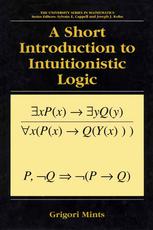

Most ebook files are in PDF format, so you can easily read them using various software such as Foxit Reader or directly on the Google Chrome browser.
Some ebook files are released by publishers in other formats such as .awz, .mobi, .epub, .fb2, etc. You may need to install specific software to read these formats on mobile/PC, such as Calibre.
Please read the tutorial at this link: https://ebookbell.com/faq
We offer FREE conversion to the popular formats you request; however, this may take some time. Therefore, right after payment, please email us, and we will try to provide the service as quickly as possible.
For some exceptional file formats or broken links (if any), please refrain from opening any disputes. Instead, email us first, and we will try to assist within a maximum of 6 hours.
EbookBell Team

5.0
100 reviewsIntuitionistic logic is presented here as part of familiar classical logic which allows mechanical extraction of programs from proofs. to make the material more accessible, basic techniques are presented first for propositional logic; Part II contains extensions to predicate logic. This material provides an introduction and a safe background for reading research literature in logic and computer science as well as advanced monographs. Readers are assumed to be familiar with basic notions of first order logic. One device for making this book short was inventing new proofs of several theorems. The presentation is based on natural deduction. The topics include programming interpretation of intuitionistic logic by simply typed lambda-calculus (Curry-Howard isomorphism), negative translation of classical into intuitionistic logic, normalization of natural deductions, applications to category theory, Kripke models, algebraic and topological semantics, proof-search methods, interpolation theorem. The text developed from materal for several courses taught at Stanford University in 1992-1999.